July eNews
Youth Initiative Camp 2024
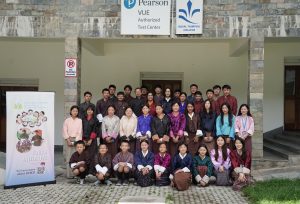
Youth Camp participants and presenters from UNICEF
A group of 33 enthusiastic young individuals from various schools and colleges across Paro, Thimphu, Haa, Samtse, Gedu, and Bumthang participated in a four-day Youth Initiative Summer Camp from 8th to 11th of July at the Royal Thimphu College. On the first day of the camp, BCMD, in collaboration with UNICEF and NCWC, delivered presentations designed to help participants understand the Convention on the Rights of the Child, the reporting process, and the concept of the child mandala. This camp has united children from the Summer and Winter Youth Initiative Camps of 2023, who contributed to the Alternative Report on Child Rights in Bhutan, along with a few new participants.
During the camp, participants explored their rights, closely reviewed the concluding observations on Bhutan’s combined sixth and seventh periodic reports, and developed actionable plans to promote and protect children’s rights in Bhutan. Additionally, they learned about their responsibilities while exercising their rights.
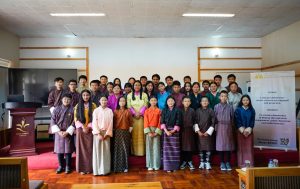
Youths and Children with Her Excellency, the Education Minister
On the final day of the camp, a half-day advocacy event on Child Rights was organised with the relevant stakeholders. Her Excellency, the Education Minister along with members of parliament, agencies, civil society organisations and international NGOs working for the welfare of the children attended the advocacy event. The event provided a crucial platform for the participants to voice their concerns and advocate on the issues affecting children’s rights in Bhutan and call for actions to address these issues.

Children advocating on Child Rights
During the advocacy event, the children participants took centre stage, presenting thoughtful discussions on several fundamental rights of children in Bhutan. They addressed issues concerning children’s rights to education, participation, protection from violence and harmful substances, privacy, appropriate information, as well as access to health, water, and food. Alongside identifying these critical issues, the children also proposed actionable solutions to address them effectively.
BCMD sincerely thanks UNICEF Bhutan for their invaluable support in bringing this project to fruition.
Sensitization Workshop for National Council of Bhutan on Civil Society Organisations

National Council Members and Secretariat Staff
To foster better understanding, creating trust and greater recognition of respective actors’ contribution to good governance and democracy, esteemed members of National Council of Bhutan and Civil Society Organisations came together during the sensitization workshop from 15th – 17th July.
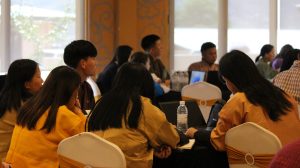
This consultation came in light of the objective to foster greater awareness, understanding, collaboration and cooperation between the CSOs and Parliamentarians in promoting a culture of participatory and inclusive policy making in Bhutan.
The Centre presented its programmes including the overview of its project, ‘Building Inclusive Democracy: Civil Society, Parliamentarians, Media and Youth strengthen good governance in Bhutan.’ The centre presented its role in fostering good governance in supporting the country’s democratic transition since 2008, and briefly presented its work in the areas ranging from democracy and media literacy to women, youth, persons with disabilities, caregivers and parliamentarians. The members were also apprised of BCMD stepping up its programmes to work in areas of promoting women in politics in the absence of Bhutan Network for Empowering Women since its closure in 2023. The NC members expressed their support towards the project components and activities that will be implemented under the current project.
The workshop was organised in collaboration with Bhutan Transparency Initiative – BTI, DW Akademie Asia, Bhutan Media Foundation, Handicraft Association of Bhutan, Helvetas Bhutan, International IDEA, RENEW, and Save the Children Bhutan through the support extended from the European Union (EU).
Training of Trainers on Asset-Based community Mapping
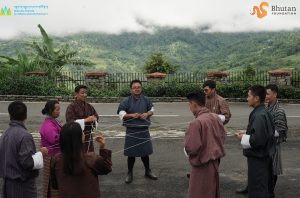
Participants engage in team building activity
A transformative four-day Training of Trainers (TOT) Asset-Based Community Mapping workshop was organised in Tsirang Dzongkhag from 23rd to 26th July to serve as a catalyst for change, focusing on shifting mindsets from dwelling on community shortcomings to harnessing existing strengths, resources, and talents. The 30 teacher participants from the nine different schools were invited to reflect on their roles within their communities and encouraged to recognize and harness community strengths. This proactive approach was seen to foster a deep appreciation for their surroundings and the people in their community.
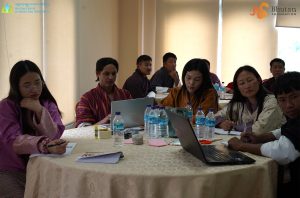
The participants gained essential skills and tools for effective community mapping and asset identification that will be critical in developing realistic, need/ asset-based local action plans in their communities. Upon returning to their respective schools, these trained participants will lead sessions to guide students in further implementing their local action plans.
This workshop not only focused on imparting skills but also in cultivating a mindset that sees opportunities in challenges, values collaboration, and believes in the power of every individual to drive change. By nurturing this mindset, the workshop aimed to empower participants to make significant and meaningful contributions to support growth and progress in their communities.
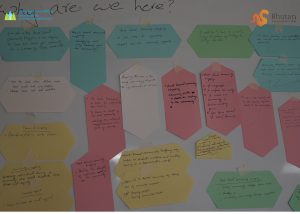
This TOT workshop underscored the crucial role that teachers played in community development. The teachers’ interests, dedication and commitment during the workshop enabled a seamless learning and understanding of the concepts and its application on the ground.
Jamyang Lhamo, a teacher at Dunglagang Primary School, shared her transformative experience, expressing how the workshop broadened her perspective on the local community. “I have been struck by the incredible diversity of assets in our community. This new perspective has been truly eye-opening for me”.
Likewise, Meena Golay, a teacher at Damphu MSS, articulated a similar shift in her understanding of the teacher’s role, noting an extended sense of responsibility beyond academic achievements alone.
Notably, the workshop emphasised the exploration of intangible community assets, representing a departure from the focus on STEM subjects. “Numerous projects and initiatives often centre around STEM subjects, with a focus on science and innovation. However, this workshop distinguishes itself by enabling teachers to further provide students with the skills required to use the opportunity to explore intangible assets present within their community”, said Tenzin, teacher at Damphu Middle Secondary School.
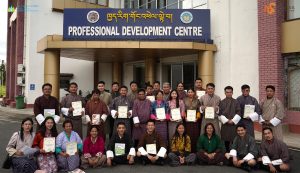
Participants were equipped with essential tools, such as social and economic mapping, to discern community issues and strengths, subsequently developing evidence-based action plans for/in their own communities. The culmination of the workshop involved participants presenting their localised action plans. The project was implemented by the Bhutan Centre for Media and Democracy with support from the Bhutan Foundation
Training on Gender and Minority Inclusion, Civic Engagement and Public Participation

A one-day training on Gender and Minority Inclusion, Civic Engagement and Public Participation under the Project, ‘Building Inclusive Democracy: Civil Society, Parliamentarians, Media, and Youth Strengthen Good Governance in Bhutan,’ was organised on 29th July with esteemed Members of Parliament of the National Council of Bhutan and the Secretariat staff. The event was organised by the Bhutan Centre for Media and Democracy in partnership with DW Akademie Asia.

This initiative was a significant step towards fostering a more inclusive, engaged, and participatory democracy in Bhutan. By equipping our policy makers with the knowledge and skills to support gender minorities and promote active citizen involvement, we aim to build a more resilient and inclusive society. The training explored why and how inclusive approaches to national and global development are good for society as a whole, and policy making is taken up in relevance to socio-political context and the relevant national and international goals such as the Sustainable Development Goals.

With the open discussion and programmes relating to different areas, BCMD commits and dedicates the work to foster a more inclusive and participatory society, ensuring every voice is heard and valued.
We thank the EU for funding the project.
Training on Advocacy Skills, Strategic Media Engagement, Research, and Policy Review

Training on Advocacy Skills, Strategic Media Engagement, Research, and Policy Review for research assistants from the Parliament of Bhutan and CSOs was organised from 30th July-1st August. The content was developed to cater to building the capabilities of young research officers in order to enhance their efficiencies at work.
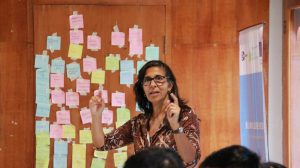
This event brought together research assistants from the National Assembly and National Council of Bhutan, along with representatives from few Civil Society Organisations. The training was organised by the Bhutan Centre for Media and Democracy in partnership with Deutsche Welle Akademie (DWA) under the project ‘Building Inclusive Democracy: Civil Society, Parliamentarians, Media, and Youth Strengthen Good Governance in Bhutan’ with funding support from the European Union.

The training aimed to empower the participants with the knowledge and skills necessary to drive positive change within their respective field. Participants were equipped with essential skills in advocacy, media engagement, research techniques, and comprehensive policy and legislative review and methodologies and briefs, that are relevant to their work.
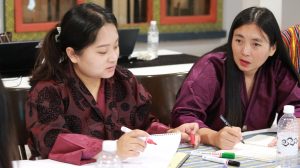
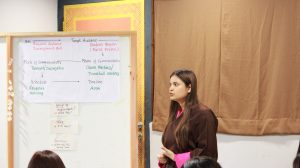
BCMD and DWA will continue to build on providing focused and advanced training to research officers in order strengthen democracy through more informed, inclusive and consultative, and evidence-based policy discussions and decisions fostering good governance.
